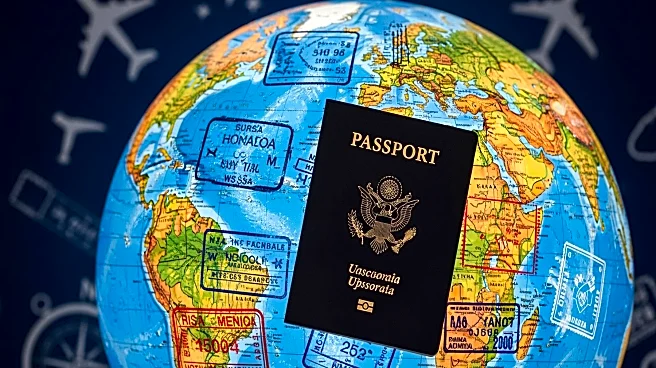What's Happening?
The latest Henley Passport Index has revealed a decline in the ranking of the United States passport, which now stands at 12th place globally. This marks a significant drop from its previous position as the world's
most powerful passport in 2014. The index measures the number of destinations that can be visited without a visa, and the U.S. passport currently allows visa-free entry to 180 countries. The decline is attributed to recent policy changes, including the loss of visa-free access to Brazil for U.S. passport holders, a move based on reciprocity grounds. Additionally, countries like Vietnam have expanded their visa-free entry policies to include more European Union countries, excluding the United States.
Why It's Important?
The shift in the U.S. passport's ranking has implications for American travelers, who may face increased visa requirements and travel restrictions. This change reflects broader international relations and reciprocity in visa policies, which can affect tourism, business travel, and international diplomacy. The decline in passport power may influence the U.S.'s ability to negotiate travel agreements and could impact the country's global mobility and economic interactions. As other countries expand their visa-free access, the U.S. may need to reconsider its own policies to maintain competitive travel advantages.
What's Next?
The United States may need to address its visa policies to regain its position among the top-ranked passports. This could involve negotiating reciprocal agreements with countries that have recently restricted visa-free access for U.S. citizens. The ongoing changes in global travel policies may prompt discussions among policymakers and stakeholders about the balance between national security and international mobility. Future updates to the Henley Passport Index will likely reflect these negotiations and any adjustments in U.S. travel policies.
Beyond the Headlines
The decline in the U.S. passport's ranking highlights the importance of international diplomacy and the impact of visa policies on global mobility. It raises questions about the principles of reciprocity and fairness in international travel agreements. The situation underscores the need for countries to adapt to changing geopolitical landscapes and the potential long-term effects on tourism and international business relations.









